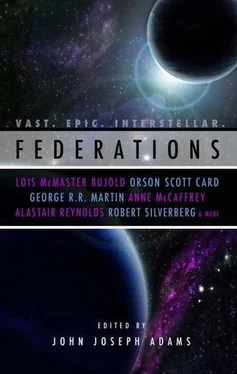Yeah, she’s mad at me now, but she’ll have other chances. Won’t be long before all the other aliens out there show up. A billion stars in the sky? There’s got to be more than just three kinds.
TWILIGHT OF THE GODS
by John C. Wright
John C. Wright is the author of nine novels including the recent Null-A Continuum , an authorized sequel to A.E. van Vogt’s World of Null-A . The first book in Wright’s Chaos Chronicles series— The Orphans of Chaos —was a finalist for the Nebula Award. His first novel, The Golden Age , was a finalist for the John W. Campbell Memorial Award for best SF novel of the year. He is also a retired attorney, newspaperman, and newspaper editor, who lives in the commonwealth of Virginia with his wife, author L. Jagi Lamplighter, and his three children Orville, Wilbur, and Just Wright.
“Twilight of the Gods” is a sequel to Wright’s short stories “Not Born a Man” and “Farthest Man From Earth,” and is his attempt to tell the story of Wagner’s The Ring of the Nibelung in space. “All three tales take place in a common background or future history, where the human race has discovered the secret of immortality on 36 Ophiuchi,” Wright said. “Only an incentive such as eternal youth, in my opinion, could motivate the human race to overcome the near-infinite expense and hardship of interstellar travel.”
Tall golden doors loomed up behind the dais of the throne. Behind those doors, it was said, the Main Bridge of the Twilight of the Gods reposed, a chamber dim and vast, with many altars studded all with jeweled controls set before the dark mirrors of the Computer. But Acting Captain Weston II found the chamber oppressive, and did not like the mysterious dark mirrors of the Computer watching him, and so, since his father’s death many years ago, this white high chamber before the golden doors was used as his hall of audience.
The chamber was paved in squares of gold and white, with pillars of gold spaced along white walls. Hanging between the pillars were portraits of scenes from somewhere in the ship the Captain had never seen; fields of green plants, some taller than a man, growing, for some reason, along the deck rather than in shelves along the walls. In the pictures, the deck was buckled and broken, rising and falling in round slopes (perhaps due to damage from a Weapon of the Enemy) with major leaks running across it. The scenes took place in some hold or bay larger than any Acting Captain Weston II had seen or could imagine; the overhead bulkhead was painted light blue, some sort of white disruption like steam-clouds floating against it. In many pictures, the blue overhead was ruptured by a large yellow many-rayed circular explosion, perhaps, again, of a Weapon.
In most pictures were sheep or other animals, and young crewmen and women, out of uniform, blissfully ignoring the explosion overhead, and doing nothing to stop the huge leaks, one of which had ducks swimming in it.
Acting Captain Weston II found the pictures soothing, but disturbing. He often wondered if the artist had been trying to show how frail and foolish men are, that they will trip lightly through their little lives without a thought to the explosions and disasters all about them. Perhaps he preferred this chamber for that reason.
What the original use and name of this chamber had been in days gone past, no man of the Captain’s Court could tell, not even his withered and aged Computerman.
The chamber now was bare, except that the Computerman approached the throne and knelt to Weston. “My lord,” he said. His face was worn and haggard, his garb simple, rough, and belted with a hank of rope. The Computerman’s eyes showed red and staring, a certain sign of the many long nightwatches he had spent writhing in the grip of the holy drug, which allowed his brethren to commune with the Computer.
“Why do you come unbidden unto me?” Weston asked sternly. “I know you await another,”
The Computerman replied. “It is to warn you against that other, that I am come.”
The Acting Captain raised his hand, but the Computerman said swiftly, “Bid me not to go! Unless you would not heed the will of the Computer in this thing, the Computer which knows all, indeed, even things most secret and shameful.”
The Captain had a troubled look upon his face, and sat back with one hand clutching the front of his jeweled coat, as if to hide something behind his hand, something, perhaps, on a necklace hidden beneath his tunic. “What shame?” he said.
“Every child knows the story of the Ring of Last Command,” the Computerman said. “Of how, when the Sixth Barrage destroyed the lights and power of the second hundred decks, and Weapon of the Enemy opened the Great Chasm in the hull, reaching from the stars below almost to the thousandth deck, the first Captain, Valdemar, capitulated to the Enemy, and allowed a Boarding Party to come in from the Void Below the Hull. Decks Three Hundred through Seven Hundred Seventy rebelled, and followed bright Alverin into battle against the traitor Captain. But the Captain was not found, and his Ring of Final Command was lost. The ring, they say, can waken the Computers all again, and send the Weapons of the Twilight down into the Void.”
“Children’s fairy-tales,” the Captain said.
“Yet, I deem, they tempt you,” the Computerman said.
The Captain was silent.
“This prisoner which the giant brings; he had a ring inscribed with circuits, did he not? A ring which matches the descriptions of the Command Ring? You dream of learning the Secret Word which controls that Ring, and of conquering the world, of driving back the tall elves from decks above, where they fly and know no weight, and compelling the twisted dwarves from Engineering to obedience to your reign, and, one day, who knows? you think you will drive forth the Destroyers, and the servants of the enemy who infest the many antispinward decks, and hurl them down into the Void from whence they came. You dream a dream of vile pride; you are corrupted with temptation.”
The Captain rose angrily from his throne. “Stop! Do you think your holy office will protect you from my wrath? Were there such a ring as legends say, for certain I would seize it to my own. And who would dare deny me? You? You?”
But the Computerman bowed in all humility, and said, “My lord knows there can be no such ring. A ring to waken the computers, indeed! Our faith informs us that the Computers do not sleep, that their screens are not dark, not to eyes that keep the faith. I and my brethren commune with the computers each nightwatch, and it gives us secret knowledge.”
“My father told me the Computer screens once were bright to every eye, and a voice like a man’s voice spoke from them, every man, even the humblest, could hear that voice. Before the Fifth Barrage, in his youth, he had seen them shining, and heard the voice.”
“Men knew less sin in those days, my lord.”
At that moment came a noise at the doors before them, not the golden doors of the Bridge, but the silver doors leading to the outer part of the palace and to the corridors and warrens of the great city of Forecomcon. The silver doors swept wide; here were twenty pikemen of the Gatewatch, dressed in blue and silver, and here, garbed hugely in the gray-green of the ancient order of Marines, strode in the giant.
The giant’s shoulder was taller than a tall man’s head, but his hair and beard were white with age. For he was the last of his kind, born to serve as a Marine, created by the lost arts of the Medical House, back when the Twilight was young. His name was Carradock.
In one hand Carradock held a mighty weapon like a spear, made by ancient and forgotten arts. The weapon could shoot bullets like a musket, except that it could fire many at a time, yet the bullets were slow, and would not pierce the bulkheads, or damage the equipment, and so the weapon was lawful according to the Weapons Law.
Читать дальше












